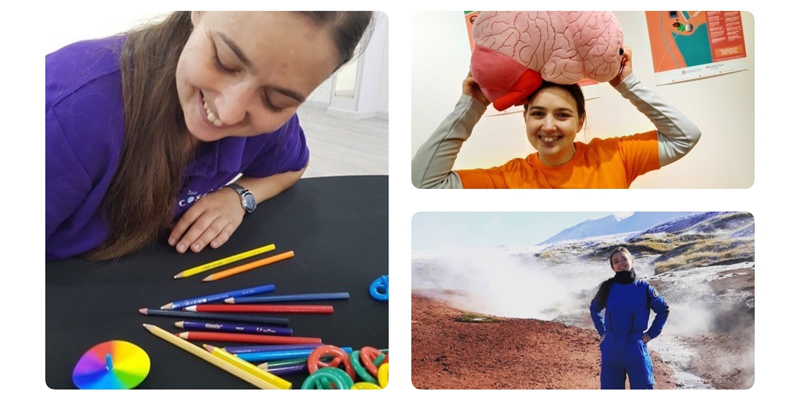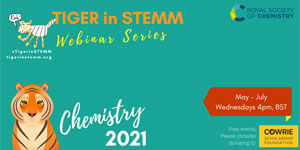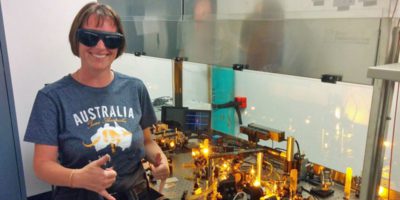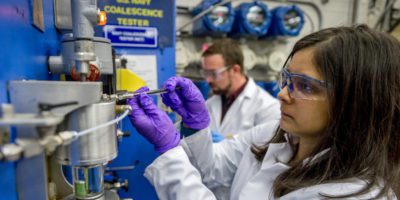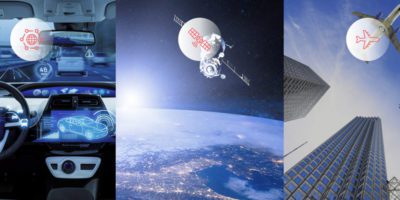Dr Claudia Antolini holds a PhD in Astrophysics from SISSA, Trieste and she completed a master’s course in Space and Science Technologies. She is currently working as a science communicator and she is part of Tiger in STEMM, a group supporting justice, diversity, inclusion, accessibility, and equity for students or people working in academia. Her research projects while in academia concerned the evolution of dark energy, the cosmic microwave background radiation, theories of parity-violating gravity, and particle cosmology.
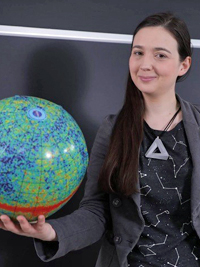
“Science is something that doesn’t work 99% of the time. It’s okay to feel stuck. It’s okay to feel discouraged. We’re doing something that is incredibly hard, like measuring the mysteries of the universe. So, of course, it’s not going to work at the first try!”
An uncommon education with broad horizons
My education started in an uncommon way. I completed all my education in Italy, and the main topic of my high school education was classical studies. Therefore, I have five years of education in Greek and Latin. Most people in Italy tend to approach physics after a cycle of high school that is more focused on mathematics and physics, which seems like a more sensible choice. So clearly, I wasn’t going to do that, because I’m not sensible.
I like to do many different things and when I was finishing junior high school, I was academically proficient in a number of different subjects. I tried to keep everything as open as possible and explore my interests without pigeonholing myself too early on.
Because my education wasn’t undertaken in the UK, this is something I have a bit of trouble explaining to people here because it’s not a system they are familiar with, but I find it very interesting to compare different educational systems.
My high school education is actually not really science focused at all and I treasure that, because it has given me the opportunity to explore the humanities, and it has given me the chance to hone my writing, and my critical thinking skills, which are skills that you use in a science career. It broadened my horizons.
Scientists shouldn’t just be educated in science
It’s very important to keep exploring and keep giving yourself the chance to learn and keep learning, no matter what the subject, in as many different things as possible. Especially now there is a very wide debate about the ethics of science. I feel very strongly that scientists should be trained in philosophy, in history and in literature, to hone those philosophical and thinking skills. That’s not only thinking logically about science, but considering the social implications that our science has.
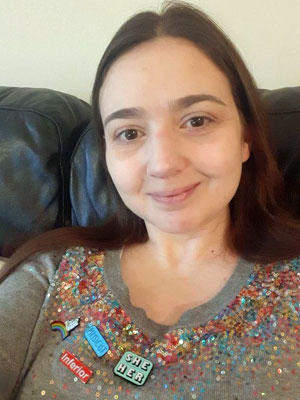
After I finished high school, I went on to a Bachelor of Science in physics. Essentially, during the final year of my high school, I realised this is what I really wanted to do, I felt extremely curious and I found a sense of purpose in physics and astronomy. I could see the reactions of people around me being a bit baffled that I was so convinced and so keen to explore something that was quite niche, something that not everybody really does.
I just loved it. I just enjoyed it because I felt like it was helping me make sense of things. So, with that spirit, I started my university degree. That’s when I realised I wasn’t 100% prepared for the challenge. My mathematics skills were good, but were they good enough for what was in front of me? Not because I didn’t study, but just because it was incredibly complex.
Mathematics is like a language
It was definitely a changing pace, and I doubted myself a lot. During the first year, especially, I felt like I wasn’t going to make it, I felt like maybe I was going to drop out and change subject because maybe it was just too hard for me and I wasn’t able to do it.
I remember looking through information for other degrees one afternoon and I felt so horrible because everything that didn’t have mathematics just wasn’t appealing to me. But then I remember that was a bit of a turning point and I said to myself: “Okay, I have to make this somehow, one way or another.” So, the first term was quite challenging, but then I realised that mathematics is like a language.
Until then, I had the fundamentals of the language, but I didn’t have the full vocabulary, and I didn’t have the full syntax. I was good at some of the grammar, but I didn’t have the full expression of mathematics, so I became more fluent and more confident, and more able to operate in that kind of environment.
Not the only one
I went through my bachelor’s struggling with anxiety and struggling with not having many other young women around me in physics, but I was determined enough that I wouldn’t let that bring me down. In the first three years, I had maybe one or two lecturers who were women, so I wasn’t necessarily exposed to strong role models, but to me at that particular time, I didn’t feel like it mattered that much, or it hasn’t discouraged me from trying. I’m not saying it wouldn’t have helped. Maybe I was determined to become the one I couldn’t see.
I was determined enough and I was hard-headed enough so that didn’t stop me, but I recognise that for other people who don’t have the same kind of personality as me, they might have the talent and the interest, but if that support network is lacking, it can put people off, and push them away. You don’t want to feel like you’re the only one. Not everybody copes well with that and it shouldn’t be that way. I experienced sexism in my degree, and nobody should experience mistreatment or discrimination for being the person they are.
Don’t. Give. Up.
The last year of my bachelor’s was hard, because I had quite serious health and personal issues. I considered dropping out when I just had a few exams to go, because I had lost a term of lectures. I was just feeling I couldn’t understand what I had to study, I couldn’t sit for exams. That was quite a low moment, but I managed to sort myself out to be able to finish what I had started, because by then, I had another goal – to start a master of science course and to become an astrophysicist.
By the time I graduated from my bachelor’s degree, I was actually already following lectures for my masters and I did both for a few months so I could to get myself in the space. I achieved that thanks to support from my family, from lecturers, and the other people studying alongside me. So, I believe your environment can do so much.
“I will succeed.”
Those were the years that I really had to start believing in myself more and thinking: “I will succeed.” I might not always be the most talented, I might not always be the brightest but I will succeed because I’m the person who wants it the most. So, I powered through my masters and I really had very good results. Not that grades matter. But it helped showing me that I had what was needed, that people’s assessment of me was also positive, so it validated me to some extent.
When I was done with my master’s degree, I immediately started a PhD in astronomy. All my studies to this point had been in Rome. I then moved to Trieste, a town in north east Italy and I pursued a four-year PhD over there. By this time, I knew that I wanted to be an astronomer. It wasn’t even a question anymore. I had wanted to get into astronomy from when I was 17 or 18 years old.
Formative years
During my PhD, I kept going with all my scientific work, but that’s also when I started doing outreach work and getting involved with the student council. I was president of the student council for two years and during my term I would constantly champion international students who had to leave their family behind, had less of a support network and a language barrier in an overseas country.
I also became a member of women’s history group, Toponomastica Femminile, and I did lots of research on local history to highlight women that had contributed to the community in different ways and but had since been forgotten. I wanted their contribution to the community to be highlighted and celebrated.
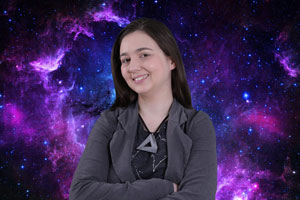
Those were very formative years for me from a feminist perspective. That is when I started questioning more and more the implications of inequalities from an intersectional perspective. What are the experiences of people from different walks of life? How can I support them in their own journey towards inclusion and equality, and how I can be a positive force for change?
After I finished my PhD, and I did my first postdoc, I actually went back for another master’s degree in space, science and technology, so the running joke in my family is that I have a lot of degrees on more or less than the same thing.
Living overseas
In-between me being born in Italy, and then coming to the UK, I’ve also lived in China, in Germany, and in Austria, working in research or science communication. It has taken me around the world. I’ve always been very driven into going out and trying to push myself outside of my comfort zone, and really seeing things for myself. I remember I always had this sense of yearning for more than what I already know. I put myself in a place to pursue those opportunities when I was presented with them, but it’s a very personal choice.
I know I have learned a lot about the world around me and about myself, but I would say the important thing is to find something that tests yourself, something that encourages you to leave your comfort zone a little bit every day and see the challenge that comes with it. Not everybody wants or is able to live this life, it’s very testing. I’ve sacrificed quite a bit, but I know I’m very privileged to have been able to do it in the first place.
Science is about not knowing – science is about finding out
As we move through education, the scientific process is presented as sort of a natural thing, as if you just have these super-smart people that looked at problems and snap, everything became super obvious, but it’s not that way.
Science is something that doesn’t work 99% of the time. It’s okay to feel stuck. It’s okay to feel discouraged. We’re doing something that is incredibly hard, like measuring the mysteries of the universe. So, of course, it’s not going to work at the first try! It’s about how we cope with that frustration. It’s about the support that we receive when we experience that frustration first-hand.
It becomes, for better or for worse, part of your daily process to look at something and know it’s not going to work, but as time goes on, you realise that the ways in which it doesn’t work, have a pattern. You look at them with a different perspective, you explore them thinking out of the box, and you think, maybe this is not working because of this and because of that.
You start making those hypotheses and pushing those thoughts on paper or on a screen, and you talk about it with other people. It’s a highly non-linear process. You don’t wake up on that day and think: “Today I’m going to quantize gravity!” That’s not the way it works. Why are people so proud of their results? Because they went through the process of finding out. Very few things in life worth having ever came easy. Science, to me, is definitely one of them.
In our education, we don’t often get a flavour of this from the way scientists portrayed in the media so whenever I am talking to people, I always try to slip in that it’s okay not to know because then you can ask any question you want. Science is about not knowing, science is about finding out.
Combining my passions in science communication
I’m now working as a science communicator, so I get to combine all my passions: Striving to know more and to test myself in different environments by expanding my comfort zone and applying my values of the importance of equality and my commitment to making sure science is used in the best possible way, for as many people from all walks of life.
For me, science communication combines the best of everything as it allows me to share that being a scientist is great. (There can be a lot of interchange with other people but being a scientist can also be a very lonely experience at times.)
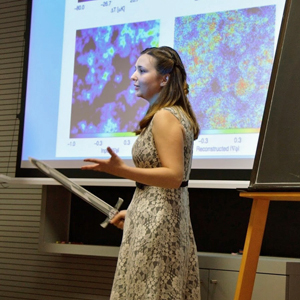
I constantly try to educate myself and advocate for people’s experiences that are different than my own. I reflect constantly about what a good ally can do for other people. I constantly try to keep this phrase in my head, so as not to get completely deflated and demotivated by what happens around us, because there’s a lot of terrible things happening. But I want to turn anger into positive action and turn it into a drive for change.
Lots of people tell me: “Oh, what’s the point, things are so bad, you’re never going to change the world by yourself.” To which I reply: “Sure. I’ll never be able to change the world by myself, but if I didn’t do it, it will be one less person trying.” You don’t have to change the whole world, you can change one bit of the world, and you could make a massive difference.
You never know who’s watching, you never know who you could inspire to join you. I might not be in a history book but that’s not enough to discourage me from trying. I still want to try because I think it’s the right thing to do – I owe it to myself, for the obstacles I’ve encountered in my life to try to make it right for younger me. I owe it to everybody that experiences injustice today.
I also want to try to make it right for all the people that are younger now, and all the people who will be on this planet in the future. I have to make it right for them, or at least I have to try. I might not change the world, but it won’t be because I didn’t try.
I speak to loads of people through my work. In COVID times, clearly, this has been a lot more challenging. We’ve been doing our activities more online, but I still get to interact with people via social media, via Zoom, and many other tools. I talk to people (in a socially distanced way, of course) when I meet them every day, and even when I’m not working I find myself chatting about science a lot,
Introducing TIGER in STEMM
TIGER in STEMM is a group of people working or studying in academia, in particular in science, technology, engineering, mathematics, and medicine (STEMM). Its aims are all about supporting justice, diversity, inclusion, accessibility, and equity. The group actively pursues its goals through a variety of campaigns to achieve real change in academia.
The TIGERs are a great group, and I learn a lot from them every day! They push me to think about how to build a healthier research environment and bring different voices together. It’s a very diverse group. I was one of the promoters and organisers of the physics webinar series last summer, an inclusive and diverse series of talks that featured amazing speakers from a variety of backgrounds.
The importance of diversity of thought in science
With people from all different backgrounds and all walks of life, we can produce better science and we can fulfill the real aim of science, which is to improve everyone’s life conditions, and we really need that diverse input in order to achieve that. This is true in the space sector, but for all sectors in general I would say.
We are facing unprecedented challenges: the world is trying to recover from a pandemic, climate change is looming, and Earth’s resources are getting depleted. The only way to solve these issues and make sure that everybody benefits from accessing technology and science is to get people from all walks of life to shape the solutions. The issues we are facing are formidable: without the best talents we won’t make it.
It’s also about justice: too often in history we have seen that women, people from non-white ethnic backgrounds, disabled people, and people who identify as LGBTQ+ have been marginalised, discriminated against and forgotten. We are the generation that won’t stop until we see a real change.
Advice for girls and women interested in space careers
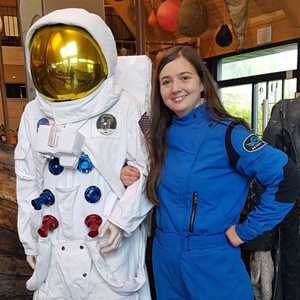
With the pandemic, everybody is doing online events – search for events that are space-themed, and ask questions to the speakers. And also, the most important thing of all, is that we don’t get to the stars unless we get there together. Listen to people that have different experiences than you, and always support each other. There are many things that we need to improve, and together we can do it.
The future
I have loads of ideas in my head. A long-time dream of mine is to write a book. I have a couple of ideas, so I have to be brave enough and pitch them, and who knows, one of them might work!
I’m also supporting TIGER in STEMM with a webinar series in chemistry. It’s really exciting and inspiring to work on a best practice initiative. I’m very excited to see what will happens with the series and to hear talented early-career scientists sharing what they know, and will share their journeys with so many other people. I’m very happy I can play a small role in making it possible.
https://www.linkedin.com/in/antoliniclaudia

